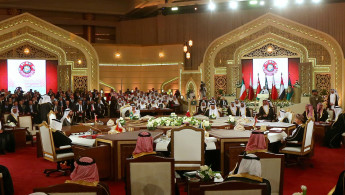Gulf analysts react to landmark Gulf-US summit
The highly anticipated Camp David summit between the United States and Gulf Cooperation Council countries is set to begin on Wednesday, but Gulf political analysts speaking to al-Araby al-Jadeed have downplayed its significance.
The meeting, widely considered to be the most important US-Gulf meeting for 50 years, is unlikely to change US moves for a nuclear deal with Iran and wider rapprochement with the GCC's main foe in the region.
“The US has an agenda and is determined to see it through,” Yusuf al-Kuwailit, a political analyst, told al-Araby. “If Israel, which is closer to the US than the Arab nations, cannot change the US vision towards Iran and its nuclear programme, then the Arab nations will definitely not be able to do that.”
“For this reason, we [in the Gulf] are not optimistic about the summit, because they will give us promises without commitment and implementation,” Kuwailit added.
This lack of optimism can also be partly explained by the absence of four of the GCC's six leaders from the summit. King Salman bin Abdulaziz of Saudi Arabia has decided to stay in Riyadh to follow up the humanitarian truce in Yemen instead of meeting US president Barack Obama, while Sultan Qaboos of Oman, the King of Bahrain Hamad bin Khalifa, and the president of the United Arab Emirates, Sheikh Khalifa bin Zayed Al Nahyan, will all be unable to attend the summit.
The absence of these leaders underscores the tension and mistrust haunting the US-Gulf alliance. The summit could be an opportunity for the US administration to move from words to action with regards to its pledges to the GCC, but Kuwailit disagrees.
“The fact that a state like Saudi Arabia, which is a main pillar of the summit, will not be sending King Salman, is a message saying that we do not accept half-solutions,” he said.
“Obama has clearly stressed that Iran's encroachment in the region is because of its internal problems, and that the US has nothing to do with it, even though it was the US that handed Iraq to Iran and created problems in Syria,” Kuwailit concluded.
Unified position
Kuwailit's views are echoed by Kuwait's former information minister Saad bin Tufla. He said that the most important thing to come out of the summit will be a unified Gulf position on developments in the region, but added that the rest will be rhetoric.
“Obama will not offer anything more than verbal reassurances, and claim he that he will not give Iran concessions at the expense of Gulf interests – but I don't believe hat he will offer enough,” bin Tufla said. “He is in the process of concluding a deal with Iran, which will mean that he supports Iran's expansionist and sectarian policies and meddling in Arab affairs.”
Bin Tufla stressed that it is crucial for the Gulf nations to have a unified position towards their strategic ally against Iranian moves in the region.
“The fact that King Salman has declined to attend should be understood to mean that he is not satisfied with the US double standards in the region,” he said, adding that Obama was “trying to have his cake and eat it” by reassuring his allies while continuing to negotiate with Iran.
Majed al-Turki, a political analyst, said that it was time for Gulf states to seek new alliances.
“The Gulf nations must look for a new source of armaments, such as Europe, Russia and China,” Turki said. “The US is not the only source of armaments, the Gulf countries do not have to engage in bargaining, as they have access to huge financial resources that allow them to purchase from any source and the open market.”



